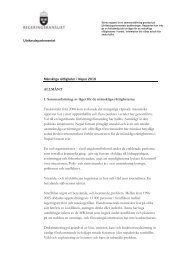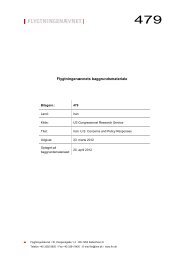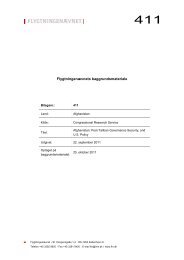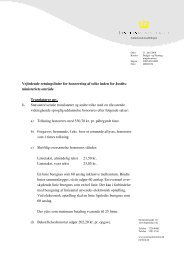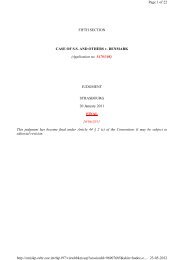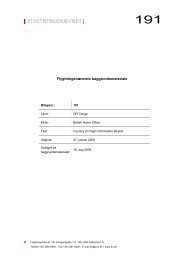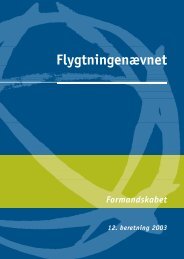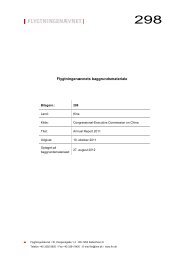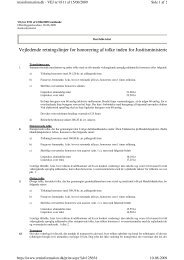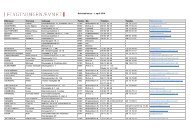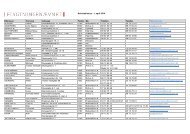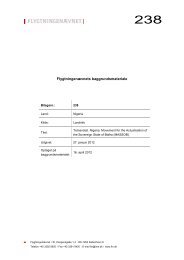Annual Report - National Human Rights Commission
Annual Report - National Human Rights Commission
Annual Report - National Human Rights Commission
Create successful ePaper yourself
Turn your PDF publications into a flip-book with our unique Google optimized e-Paper software.
An Overview<br />
○ ○ ○ ○ ○ ○ ○ ○ ○ ○ ○ ○ ○ ○ ○ ○ ○ ○ ○ ○ ○ ○ ○ ○ ○ ○ ○ ○ ○ ○ ○ ○ ○ ○ ○ ○ ○ ○ ○ ○ ○ ○ ○ ○ ○ ○ ○ ○ ○ ○ ○ ○ ○ ○ ○ ○ ○ ○ ○ ○ ○<br />
○<br />
recommendations suggested to the Central and the State Governments. The <strong>Commission</strong> is<br />
monitoring the response.<br />
2.16 For the sake of the protection of human life of the mentally ill prisoners, the <strong>Commission</strong><br />
moved a criminal writ petition before the High Court of Delhi praying for quashing of the trial of<br />
Charanjit Singh whose condition had deteriorated despite prolonged treatment in various hospitals/<br />
institutions. The High Court while quashing the charge sheet against Shri Charanjit Singh observed<br />
that it had been clear that the under-trial prisoners cannot be tried as there was no chance of<br />
reversal of his deteriorating mental and physical condition. The High Court commended the role<br />
played by the <strong>Commission</strong> in taking up the case of desolate and destitute person Shri Charanjit<br />
Singh as well as for framing guidelines to be followed in such cases.<br />
2.17 The <strong>Commission</strong> is concerned about the discrimination faced by the persons belonging to<br />
Scheduled Castes. In this regard, the <strong>Commission</strong> is of the firm view that there is need to combat<br />
age-old biases and entrenched attitudes through education and through public information campaign.<br />
2.18 The <strong>Commission</strong> has also reviewed the provision of the <strong>National</strong> Policy on Resettlement<br />
and Rehabilitation and noted that the rehabilitation policy has not been made a part of Land<br />
Acquisition Act of 1894. The <strong>Commission</strong> is of the view that the resettlement and rehabilitation<br />
be incorporated in the proposed legislation itself so that it becomes justiciable.<br />
2.19 The <strong>Commission</strong> firmly believes that death by starvation and other distress conditions<br />
constitutes the gravest violation of the human rights of a citizen and calls for all-out state and<br />
civil society amiliorative action. With a view to formulate a programme of action for making<br />
right to food a reality in the country, the <strong>Commission</strong> approved the constitution of a Core Group<br />
on the Right to Food. The Core Group will advise the <strong>Commission</strong> on the issues referred and<br />
also suggest appropriate programmes which could be undertaken by the <strong>Commission</strong>.<br />
2.20 Trafficking in women and children, both male and female, is a grave violation of human rights<br />
and there is a great need to deal with this problem in a comprehensive way. The <strong>Commission</strong> is<br />
organizing training programmes for judicial, police and government officers to sensitize and spread<br />
awareness among different stakeholders on the problem of trafficking in women and children. To<br />
sensitize the subordinate judiciary to the entire gamut of trafficking and other protective laws, the<br />
<strong>Commission</strong> in collaboration with Government of India, <strong>National</strong> Law School of India University,<br />
Bangalore and UNICEF prepared a judicial handbook on the issue. The <strong>Commission</strong> also continued<br />
to monitor the implementation of the guidelines issued by the Supreme Court in Vishaka v/s State of<br />
Rajasthan case. The <strong>Commission</strong> also continues to remain engaged in improving the status and<br />
upholding the rights of the destitute and marginalized women including widows living in Vrindavan.<br />
2.21 The primary obligation to protect human rights is with the State and the <strong>Commission</strong><br />
works as a facilitator to achieve that end. It is with this objective in view, that the <strong>Commission</strong><br />
<strong>National</strong> <strong>Human</strong> <strong>Rights</strong> <strong>Commission</strong> <strong>Annual</strong> <strong>Report</strong> - 2004-2005<br />
7<br />
AR-Chapter-1-19-10-6-06.p65<br />
27<br />
7/17/06, 6:29 PM



